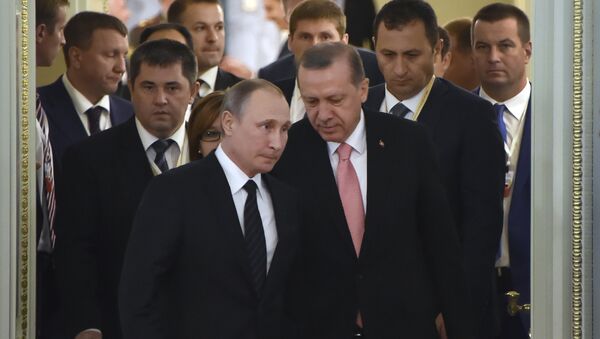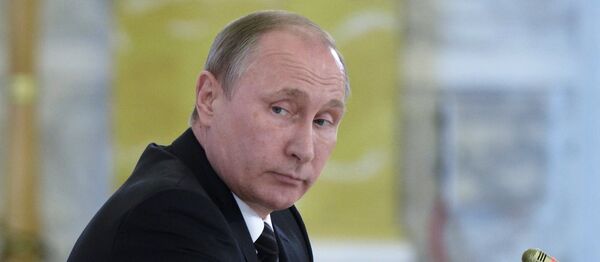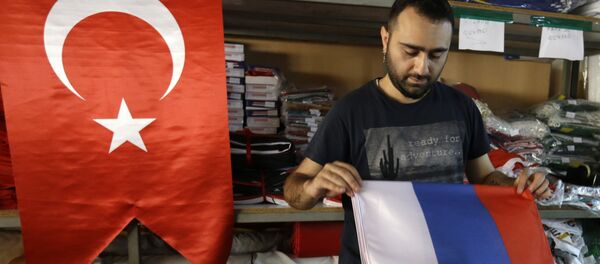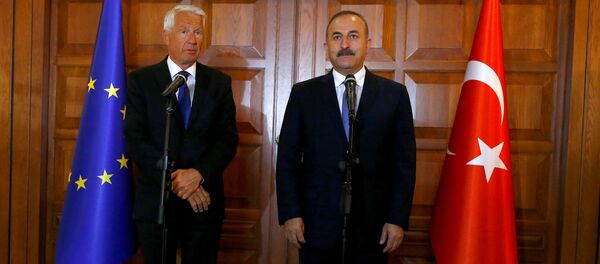“The resentment over the West is the real basis for the rapprochement between Russia and Turkey,” says an analytical piece in the magazine, with regards to the results of the recent meeting between the Russian leader and his Turkish counterpart.
For Ankara, it says, the objective was to “escape from the quarantine isolation which it has found itself in after the government’s reaction to the failed coup in the country. And to find as many allies as possible in the region, where at a time when Syria is being wrecked, Shi'ite Iran is gaining momentum.”
The author also refers to President Erdogan’s recent comment on Turkey’s relationship with the EU, when he told the French newspaper Le Monde that the European Union has been teasing Turkey for 53 years and continues to do so now.
“The annoyance over failed attempts of a rapprochement with the European Union is what actually unites Russia and Turkey,” the outlet quotes Andrei Kortunov, Director General of the Russian International Affairs Council (RIAC) as saying.
The expert suggests that the discontent with the West is a strong uniting force which is able to offset the remaining discrepancies between the two countries.
However, the joint interests, which do not coincide with those of the US and EU, could finally prevail, Kortunov says.
Another point of discord is the Kurdish issue, the expert says. Until now, Russia has been supporting the Kurdistan Workers' Party (PKK), which Turkey regards as a terrorist organization.
Kortunov therefore suggests that “such support might be implicitly denied in exchange for the recognition by Ankara of the Kurdish community after the end of the military conflict.”
"It is a hard line of Russian policy in the region," the expert stressed.
However the most difficult problem to solve is the relationship between Sunni Turkey and its “main Shi'ite rival, Iran", the outlet says, noting that it is not by chance that right before the meeting with Recep Tayyip Erdogan in St. Petersburg Vladimir Putin met with the leaders of Iran and Azerbaijan in Baku.
The magazine, however, notes that after Hassan Rouhani came to power in Iran, the tensions between the countries have eased, which has resulted in vast diplomatic consequences, which in turn might serve as a basis for a new phase in Turkish-Persian relations.
A “Moscow-Tehran-Ankara trio is now going to solve the problems in the Middle East,” L’Espresso suggests.
“Something that neither Washington nor the EU could have ever foreseen when a year ago they signed an agreement on Iran’s nuclear program, lifting all nuclear related sanctions from Tehran so that it could return back to the system of international relationships,” it adds.
On the other hand, it says, pursuant to the agreement, the US did not renew its relationship with Saudi Arabia, “Iran’s archenemy.” Washington's Saudi allies continue their standoff with Iran in Yemen and indirectly (through Wahabiite clergy and charities) finance Islamist fanatics all over the world.
It is telling Europe that “it is no longer the center of the universe.”
“The European leadership has found itself in new conditions and should now faster and more efficiently make the right decisions,” it says.
It further explains that the customary world alliances are far from being strong and stable. Rapid changes are taking place in the system of international relations.
Russia and Turkey both pursue a principle which diplomats define as “constructive opportunism”: the countries try to achieve the maximum in given circumstances, leaving aside any customary beliefs, including traditional alliances.
Such a strategy requires fantasy and originality, abilities which have long been forgotten by Western political leaders.
The message to the US, it says, is that Turkey has “other strategic options on the table.”








